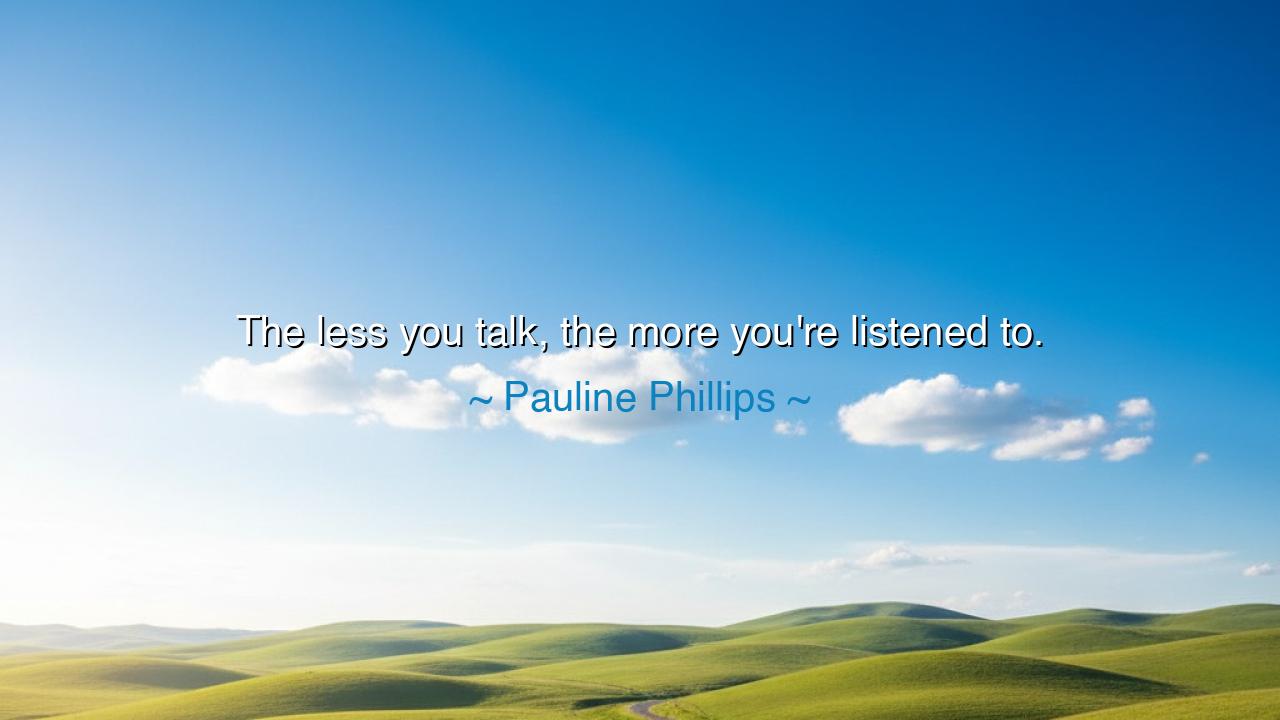
The less you talk, the more you're listened to.






Hear me, O children of wisdom, for the words of Pauline Phillips are like the gentle whispers of the wind—"The less you talk, the more you're listened to." These words carry the weight of an ancient truth, a truth that echoes through the halls of time: that in the stillness of silence, there is the power of deep understanding. In a world filled with noise, where voices clamor for attention, it is the one who speaks little but wisely who commands the greatest respect. For it is not the one who speaks endlessly that shapes the future, but the one who knows when to listen and when to speak, whose words, when spoken, are measured and true.
In the great courts of the past, where kings and leaders sought counsel, it was often the quiet advisor, the one who did not seek to fill the room with endless chatter, who held the most power. Confucius, that ancient sage, taught that true wisdom is found not in the flood of words, but in the clarity that comes from thoughtful silence. He who speaks little yet profoundly leaves a mark upon the world, for his words are like the strike of a hammer upon the anvil—deep, resonant, and full of meaning. The art of speaking little is not born of fear, but of strength—the strength to know that words are sacred, and when they are chosen, they must carry the weight of truth.
Consider the example of Leonardo da Vinci, who, though he was a great thinker, artist, and inventor, was known to speak little. His silence was not a sign of weakness, but of a mind always engaged in the deeper processes of thought and creation. When he spoke, it was with such clarity and such insight that his words resounded through the ages, guiding future generations. His genius was not found in the flood of his speech, but in the quiet contemplation that fueled his innovations. In his silence, he gathered the energy and wisdom to change the world.
In your own lives, O children, let this wisdom guide you. The world is filled with voices, many of them loud and persistent, seeking to make themselves heard. But know this: it is the voice of the one who speaks less but with purpose, who will be heard most clearly. When you speak, let your words be like the call of the eagle, sharp and clear, not like the chatter of the sparrow. In the quiet moments, you will find the power to listen—to the world, to others, and to your own heart—and when the time comes to speak, your words will carry with them the weight of truth.
Thus, remember the ancient wisdom of Pauline Phillips: that in silence there is power. The less you speak, the more you shall be heard. Speak with intention, with purpose, and with wisdom, for the world does not need more noise, but more profound truth. In a time when all seek to be heard, those who speak the least are often those who have the most to say. Let your silence be your strength, and your words the reflection of a mind and heart attuned to the deeper currents of life.






TNTrung Nguyen
This quote has me wondering about the power of silence in communication. If you’re always talking, can you ever really hear others? Maybe listening is just as important as speaking. How much of this is about understanding the value of quiet and giving space for others to speak? Do people truly listen more when you talk less, or is there a deeper connection that happens when we make an effort to really listen, too?
TTTran Tuan Tai
I can relate to this quote when it comes to conversations that are more thoughtful or introspective. Sometimes, the more you say, the more people tune out, but if you hold back, people tend to lean in and focus on what you do say. But is it always about saying less to be heard more, or could it be about saying the right things at the right time? What’s the best way to approach communication for maximum impact?
CKChi K
I’ve always struggled with talking too much in conversations, especially when I’m passionate about something. But this quote makes me wonder if I should hold back more often. Would being more concise make my points stronger? Is there a fine line between saying too little and not saying enough? How do you find that balance of contributing without dominating or, conversely, being too quiet and not being heard?
TN9.4 Thanh Nhi
This quote might be a bit counterintuitive. On one hand, it suggests that silence can make you more powerful or respected. On the other hand, I think silence might also make you seem distant or uninterested. So is it always true that less talking equals more attention? Does the type of conversation or the audience play a role in how much you should actually speak? I feel like context really matters.
VTviet tam
I can see how this idea could work in some situations, like when you’re in a meeting or trying to have a deep conversation. But is it possible to take this approach too far? Could the less you talk philosophy lead to missed opportunities or make you seem disengaged? Sometimes, speaking up is necessary to clarify, contribute, or even just to let others know you’re involved.